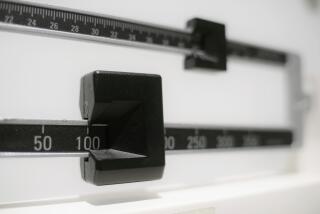Biorhythms
- Share via
The human body wouldn’t adapt well to the day lengths found on other planets, researchers have found, because it’s programmed to operate on a 24-hour clock.
Scientists with the National Space Biomedical Research Institute exposed one group of people to 23.5-hour days, which are typical for space shuttle missions; one group to 24-hour days, like those on found on Earth; and still others to 24.6-hour days, which approximate the length of a day on Mars. The test subjects spent up to 55 days in a laboratory with daytime lighting equivalent to candlelight, which is about what they’d experience in a spacecraft.
The shorter or longer days disrupted subjects’ body clocks, according to findings published recently in the Proceedings of the National Academy of Sciences. Levels of melatonin, a hormone that tells the body it’s time to snooze by rising about two hours before sleep, rose appropriately for those on the 24-hour clock. But for the others, levels went up when they were awake and dropped when they were trying to sleep.
FITNESS
Program to Encourage Exercise Backfires
For the “you can’t win for losing” file. At a time when the U.S. surgeon general has declared obesity a public health danger, a program encouraging university seniors to continue physical activities after graduation had the unintended consequence of making the women more obsessed with their weight, possibly boosting their risks of developing eating disorders.
The study, conducted at San Diego State University, followed 170 male and female students through a 15-week program that included physical activity and lectures on exercise, health, body image and healthful eating. At the end of the study, many women in the group were more active, but didn’t see any clear changes in their bodies. The net result was that, for some, rather than having a realistic attitude about fitness, their drive to be thin increased. They told researchers they were “terrified of gaining weight” and felt “extremely guilty after overeating.”
Researchers warned that these “unanticipated negative secondary effects” should be taken into account when devising exercise promotion programs.
SAFETY
Boat Passengers Who Drink Also in Danger
Researchers at Johns Hopkins School of Medicine and the University of North Carolina at Chapel Hill studied recreational boating deaths and discovered that the “don’t drink and drive” prohibition applies not just to drivers but passengers too. Boat passengers who had been drinking--even if it was only a glass or two of alcohol--had the same risk of death as intoxicated operators, whether the boat was sitting in the dock or underway.
Surveys have found that 30% to 40% of boaters freely admit to drinking while boating, but most think they’re safe as long as they’re not operating the craft. Some safety campaigns even promote the use of a designated driver when boating, researchers note.
But unlike auto accidents, only 18% of boating fatalities involve collisions with other boats or objects. The majority of deaths involve falling overboard, and almost half of these fatal calamities occur when the vessel is sitting at the dock. Researchers conclude that actions to curb boating deaths must be directed at everyone engaged in recreational boating, not just those at the helm.






